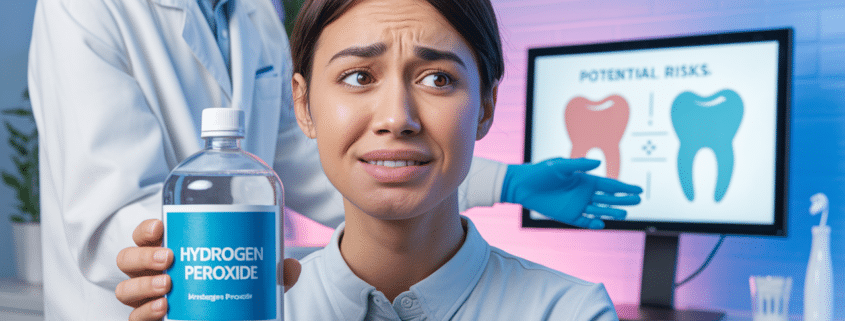Can Hydrogen Peroxide Kill Cavities? The Truth About At-Home Remedies
You felt that tiny sting when sipping cold water, turned to Google, and ended up asking, “Can hydrogen peroxide kill cavities?” It’s a common question—and one that’s fueled by TikTok hacks, home remedy blogs, and a deep desire to avoid the dentist.
But here’s the deal: cavities don’t heal themselves, and hydrogen peroxide isn’t the dental cure-all it’s often hyped up to be. That doesn’t mean it’s useless—but it does mean you need to separate fact from fiction before swishing your way into dental disaster.
TLDR – Quick Guide
- Short Answer: No, hydrogen peroxide can’t “kill” or reverse cavities
- What It Can Do: Reduce bacteria, whiten teeth, and help with gum inflammation
- Cavity Reality: Once a tooth decays, only a dentist can restore it with a filling or other treatment
- Risks: Overuse of peroxide can damage enamel and irritate gums
- Smarter Moves: Fluoride toothpaste, dental visits, and sealants are your best bet
Detailed Breakdown: Hydrogen Peroxide vs. Cavities
1. What Actually Causes Cavities?
Cavities form when bacteria in your mouth produce acids that eat away at your tooth enamel. If untreated, they burrow deeper, damaging nerves and even leading to infection.
Once a cavity has formed, it’s a structural issue—not just a bacterial one. Hydrogen peroxide may kill surface bacteria, but it can’t rebuild tooth enamel.
2. What Hydrogen Peroxide Can Do
Hydrogen peroxide has legit benefits:
- Antibacterial: Helps reduce bacteria in the mouth temporarily
- Teeth Whitening: Active ingredient in many whitening products
- Gum Health: Can reduce inflammation when diluted and used safely
But even at its best, peroxide is preventive or cosmetic—not curative.
Source: According to the American Dental Association (ADA), hydrogen peroxide is safe in controlled doses, but there’s no evidence it can reverse decay.
3. Can Hydrogen Peroxide Reverse a Cavity?
In short: No.
- Stage 1 cavities (demineralization) may benefit slightly from fluoride treatments that can remineralize enamel—but peroxide doesn’t help here.
- Active cavities (visible holes or pain) need a filling, root canal, or other intervention.
Swishing peroxide doesn’t “clean out” decay—it just numbs symptoms temporarily.
4. The Real Risks of DIY Dental Care
Using undiluted or over-the-counter hydrogen peroxide improperly can lead to:
- Tooth sensitivity
- Enamel erosion
- Gum irritation or chemical burns
- Disruption of your oral microbiome
Don’t DIY your dental health based on internet trends. Misuse could leave you worse off—and paying more at the dentist.
5. Better Ways to Fight and Prevent Cavities
Skip the shortcuts and focus on what works:
- Brush twice a day with fluoride toothpaste
- Floss daily to remove plaque between teeth
- Limit sugar and acidic drinks
- Use fluoride mouthwash
- See your dentist every 6 months for cleanings and X-rays
If you’re worried about early enamel wear, your dentist might recommend fluoride varnish or prescription toothpaste.
Key Takeaways
- Hydrogen peroxide can’t “kill” or cure cavities—it’s not a substitute for dental treatment.
- It has some antibacterial and whitening benefits when used safely and correctly.
- Misusing peroxide can damage teeth and gums, potentially worsening your oral health.
- Cavities need professional care—fillings, sealants, or other restorative treatments.
- Prevention is your best defense: fluoride, brushing, flossing, and regular dental visits.
FAQs
Can I use hydrogen peroxide as a mouthwash?
Yes—if properly diluted (usually a 3% solution mixed 1:1 with water) and not used daily. But it should never replace brushing or flossing.
Will hydrogen peroxide make a cavity worse?
Overuse can weaken enamel and irritate gums, making your mouth more vulnerable—not less.
Can hydrogen peroxide stop a cavity from growing?
No. It may reduce surface bacteria, but it doesn’t stop the decay process or rebuild lost enamel.
What’s better than peroxide for oral health?
Fluoride toothpaste, flossing, a balanced diet, and regular dental checkups offer real cavity protection.
What should I do if I suspect a cavity?
Book a dental appointment ASAP. Early treatment is faster, cheaper, and less invasive.




Leave a Reply
Want to join the discussion?Feel free to contribute!